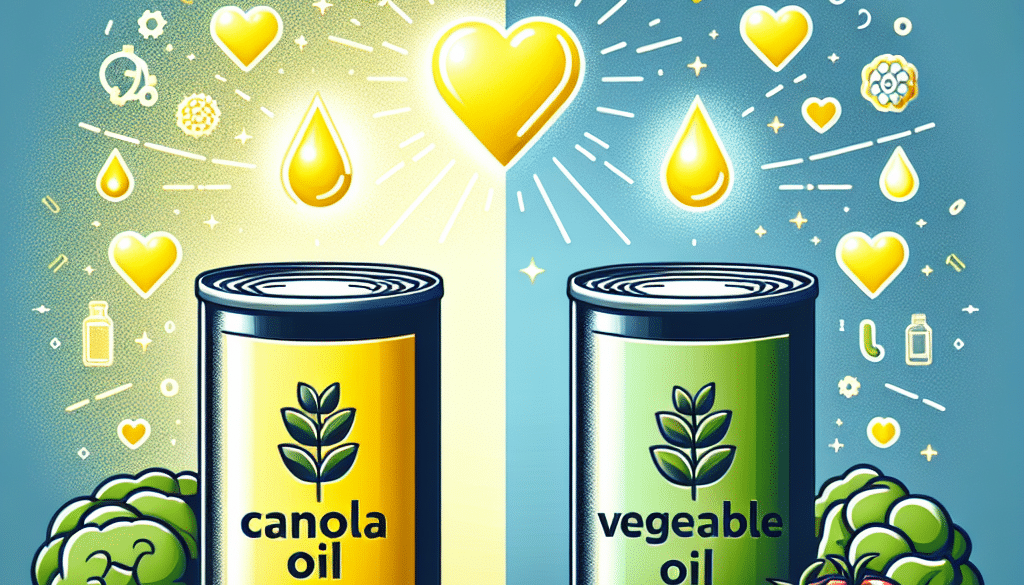What’s Healthier Canola Or Vegetable?
-
Table of Contents
- Canola vs. Vegetable Oil: Which Is the Healthier Choice?
- Understanding Canola and Vegetable Oils
- Nutritional Profiles: Canola vs. Vegetable Oil
- Health Benefits and Considerations
- Potential Drawbacks
- Case Studies and Statistics
- Conclusion: Making the Healthier Choice
- Discover ETprotein’s High-Quality Protein Products
Canola vs. Vegetable Oil: Which Is the Healthier Choice?

When it comes to cooking oils, the debate between canola and vegetable oil is a common one. Both oils are widely used in kitchens around the world, and each has its proponents and detractors. In this article, we will delve into the health aspects of both canola and vegetable oils, examining their nutritional profiles, health benefits, and potential drawbacks. By the end of this discussion, you should have a clearer understanding of which oil might be the healthier choice for your dietary needs.
Understanding Canola and Vegetable Oils
Before we compare the health benefits of canola and vegetable oils, it’s important to understand what each oil is and where it comes from.
- Canola Oil: Canola oil is derived from the seeds of the canola plant, which is a genetically modified version of the rapeseed plant. The name “canola” is a contraction of “Canadian oil, low acid,” reflecting its origins and lower erucic acid content. Canola oil is known for its light flavor and high smoke point, making it a versatile oil for cooking.
- Vegetable Oil: Vegetable oil is a bit of a misnomer, as it is not made from vegetables but rather is a blend of several plant-based oils. Common components of vegetable oil include soybean, corn, sunflower, safflower, and palm oils. The exact blend can vary by brand, which means the nutritional content can also vary.
Nutritional Profiles: Canola vs. Vegetable Oil
When comparing canola and vegetable oils, it’s essential to look at their nutritional content to understand their health implications.
- Fat Composition: Both canola and vegetable oils are high in unsaturated fats, which are considered heart-healthy. Canola oil is particularly high in monounsaturated fats and also contains a good balance of omega-6 and omega-3 fatty acids. Vegetable oil blends can vary, but they generally have higher levels of polyunsaturated fats and may have a less favorable omega-6 to omega-3 ratio.
- Vitamin E: Both oils contain vitamin E, an antioxidant that helps protect your cells from damage. The amount of vitamin E can vary in vegetable oils depending on the blend.
- Phytosterols: Canola oil contains phytosterols, which are plant-based compounds that can help lower cholesterol levels. While some vegetable oils also contain phytosterols, the levels can vary.
Health Benefits and Considerations
Both canola and vegetable oils have their own set of health benefits and considerations that should be taken into account.
- Heart Health: Due to its high monounsaturated fat content and balance of omega-3 to omega-6 fatty acids, canola oil is often considered beneficial for heart health. It may help reduce LDL cholesterol levels and lower the risk of heart disease. Vegetable oils with a high polyunsaturated fat content can also be heart-healthy, but the benefits may be less pronounced if the omega-6 to omega-3 ratio is not balanced.
- Inflammation: An imbalance of omega-6 to omega-3 fatty acids can contribute to inflammation in the body. Canola oil’s balanced ratio may make it a better choice for those concerned about inflammation-related conditions.
- Smoke Point: Canola oil has a high smoke point, which makes it suitable for high-heat cooking methods like frying. While vegetable oils can also have high smoke points, the exact temperature can vary depending on the blend.
- Processing: Some critics of canola oil express concerns about the processing methods used to extract the oil, which often involve high heat and chemical solvents. However, cold-pressed canola oil is available for those seeking a less processed option. Vegetable oils also undergo processing, and the health implications can vary depending on the type of oil and the method used.
Potential Drawbacks
Despite their benefits, there are potential drawbacks to consider with both canola and vegetable oils.
- Trans Fats: Partially hydrogenated oils, a source of unhealthy trans fats, have been phased out of many products. However, some vegetable oils may still contain trace amounts of trans fats due to processing. It’s important to check labels and choose oils that are non-hydrogenated.
- Genetic Modification: Canola oil is often made from genetically modified crops, which is a concern for some consumers. Non-GMO canola oil is available, but it may be more expensive. Similarly, many vegetable oils come from GMO crops, particularly soybean and corn oils.
- Environmental Impact: The production of canola and vegetable oils can have environmental impacts, including deforestation and the use of pesticides and fertilizers. Sustainable and organic options may mitigate some of these concerns.
Case Studies and Statistics
Several studies have compared the health effects of different dietary oils. For example, a study published in the Journal of the American Dietetic Association found that canola oil reduced belly fat when used as part of a healthy diet. Another study in the Journal of Nutrition suggested that the type of fat found in canola oil might improve insulin sensitivity.
Statistics from the United States Department of Agriculture (USDA) show that canola oil consumption has been increasing in recent years, possibly due to its perceived health benefits. However, vegetable oils, particularly soybean oil, remain the most consumed type of oil in the United States.
Conclusion: Making the Healthier Choice
In conclusion, both canola and vegetable oils have their place in a balanced diet. Canola oil’s high monounsaturated fat content and balanced omega fatty acids make it a strong contender for the healthier choice, particularly for heart health and reducing inflammation. However, it’s important to consider factors such as processing methods, potential GMO content, and environmental impact when making your decision.
Ultimately, the healthiest oil for you may depend on your specific dietary needs, cooking methods, and personal values. It’s always a good idea to use a variety of oils to ensure a balance of fats in your diet and to choose high-quality, minimally processed oils whenever possible.
Discover ETprotein’s High-Quality Protein Products
If you’re looking to complement your healthy diet with high-quality protein products, consider ETprotein’s offerings. ETprotein is a reputable manufacturer and supplier of organic bulk vegan proteins and L-(+)-Ergothioneine (EGT). Their products, including organic rice protein, pea protein, and various seed proteins, are characterized by a neutral taste, non-GMO, allergen-free attributes, and high purity levels.
ETprotein caters to a diverse range of industries, serving nutraceutical, pharmaceutical, cosmeceutical, veterinary, as well as food and beverage distributors, traders, and manufacturers worldwide. Their specialization in exporting and delivering tailor-made protein powder and finished nutritional supplements ensures comprehensive solutions to meet all your protein needs.
As a trusted company by leading global food and beverage brands and Fortune 500 companies, ETprotein reinforces China’s reputation in the global arena. For more information or to sample their products, please contact them and email sales(at)ETprotein.com today.
About ETprotein:
ETprotein, a reputable protein and L-(+)-Ergothioneine (EGT) Chinese factory manufacturer and supplier, is renowned for producing, stocking, exporting, and delivering the highest quality organic bulk vegan proteins and L-(+)-Ergothioneine. They include Organic rice protein, clear rice protein, pea protein, clear pea protein, watermelon seed protein, pumpkin seed protein, sunflower seed protein, mung bean protein, peanut protein, and L-(+)-Ergothioneine EGT Pharmaceutical grade, L-(+)-Ergothioneine EGT food grade, L-(+)-Ergothioneine EGT cosmetic grade, L-(+)-Ergothioneine EGT reference grade and L-(+)-Ergothioneine EGT standard. Their offerings, characterized by a neutral taste, non-GMO, allergen-free attributes, with L-(+)-Ergothioneine purity over 98%, 99%, cater to a diverse range of industries. They serve nutraceutical, pharmaceutical, cosmeceutical, veterinary, as well as food and beverage finished product distributors, traders, and manufacturers across Europe, USA, Canada, Australia, Thailand, Japan, Korea, Brazil, and Chile, among others.
ETprotein specialization includes exporting and delivering tailor-made protein powder and finished nutritional supplements. Their extensive product range covers sectors like Food and Beverage, Sports Nutrition, Weight Management, Dietary Supplements, Health and Wellness Products, and Infant Formula, ensuring comprehensive solutions to meet all your protein needs.
As a trusted company by leading global food and beverage brands and Fortune 500 companies, ETprotein reinforces China’s reputation in the global arena. For more information or to sample their products, please contact them and email sales(at)ETprotein.com today.












